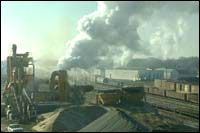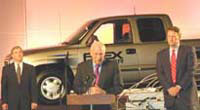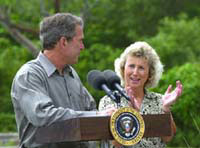Oh, it’s getting fun. As Congress prepares to reconvene next week, the question is not whether the White House will adjust its strategy on the environment, but how. When President Bush and his congressional allies went home for vacations this month, the message they heard away from the Beltway was consistent: The administration’s approach on energy, global warming, public health, and natural resources has left a lot to be desired. Act One on the environment was a policy and political disappointment for the president.

The prez at the shovel: 15
minutes of trail maintenance
in Colorado.
Photo: White House.
It was only a few weeks ago, in late July, that 19 Republican members in the House joined their Democratic colleagues and approved a measure to prevent Bush from easing new rules to limit arsenic in drinking water. The same day, Republicans and Democrats from both the House and the Senate met to confront the president and fashion a bill to reduce levels of carbon dioxide in order to slow global warming. That legislation was introduced in August. These developments were preceded by separate votes in the Republican-controlled House to defy the president’s production-focused energy plan and bar drilling off the coast of Florida and beneath the Great Lakes. Even the approval in early August of a House bill to open the Arctic National Wildlife Refuge in Alaska to oil exploration, the centerpiece of the administration’s energy strategy, is almost certain to be defeated in the Senate.
The fracturing of the Republican right was not what Bush anticipated earlier this year when he unveiled his program of limiting government’s authority to protect public health, engage in the Kyoto treaty on climate change, and conserve the nation’s natural treasures. But in pursuing an environmental strategy that a New York Times editorial called “generally deplorable,” Bush unwittingly did a public service. By forthrightly explaining the radical growth-at-any-cost objectives of the extremist right, he not only turned the environment into a top-tier political issue, but he also strengthened an emerging quality-of-life politics that could spell big trouble for his party.
Rolling Back with the Punches
Indeed, the two months between mid-March 2001 and mid-May 2001, are sure to be remembered as a remarkable and unexpected turning point for how Americans view the environment, the economy, and government’s role in managing both. The nine-week period began with Bush’s decision to abandon a campaign pledge to limit emissions of carbon dioxide into the atmosphere. It ended with the president’s production-based energy plan calling for new nuclear power plants and new drilling for oil and gas from Alaska to the Florida coast. In between came proposals to keep snowmobiles roaring in Yellowstone; maintain high levels of arsenic in drinking water; backtrack on America’s commitment to curb global warming; and weaken the Clinton administration’s plan to make air conditioners more energy-efficient. The White House also tossed in a budget proposal to slash spending for protecting natural resources and improving energy efficiency.

Old King Coal has been a merry old
soul since January.
The daily diet of announcements to roll back environmental progress, deregulate business, ignore sound science about global warming, and drill, drill, drill, was aimed solely at satisfying a core group of industrial supporters. But to the White House’s astonishment, the effort to weaken environmental safeguards and avoid international responsibility on climate change had just the opposite effect. A wave of public resentment and critical news coverage stripped away Bush’s compassionate conservative mask, cost him control of the Senate, and established environmental protection as a higher political priority in Washington and nationwide than it’s been in at least 30 years. A Washington Post poll in early June found that Bush’s reckless management of environmental policy had caused his approval ratings to plummet.
In other words, the president defined his environmental agenda last spring and discovered where the majority of Americans really stood. The public has rejected the president’s 19th-century idea of encouraging exploitation of the nation’s natural resources and, with surprising speed, has latched on to a new 21st-century, quality-of-life politic — one that stresses protecting natural assets and enhancing communities as the foundation of economic competitiveness.
Public opinion polls consistently find that voters view environmental protection and economic development as compatible goals. A New York Times/CBS News poll in late June found 57 percent of Americans favored environmental protection even if it meant paying higher energy prices. In addition, voters are rejecting ideas that pit environmental protection against economic development. In Michigan, for instance, 60 percent of state residents disapprove of Republican Gov. John Engler’s call to drill for natural gas and oil beneath the Great Lakes, because of the risk of harming recreational resources that generate more valuable economic activity.

All right, all right, all right. Michigan Lieutenant
Gov. Dick Posthumus (R), Vice President
Dick Cheney, and General Motors
CEO Rick Wagoner.
Photo: Michigan Office of the Governor.
What we may be seeing, some analysts suspect, is the unraveling of the right wing’s core political strategy. The right built its governing majority on the theme of rugged individualism that stressed opposition to abortion and gun control, promoted welfare reform and deregulation, and sought to limit government’s authority to manage land and resources.
But many of the emerging priorities of the 21st century — global warming, congestion, sprawl, globalism, water quality, neighborhood redevelopment — can only be solved with a politic based on consensus and decisions made as a community. The right wing’s grudge against the environment, as well as their self-involved, bureaucrat-bashing message of exploitation and deregulation, no longer fits.
Evidence of the emerging electoral power of the nation’s new quality-of-life politic is everywhere. Voters in Boise, Idaho, voted in May to raise property taxes to generate enough revenue to protect the city’s scenic foothills. New Jersey’s Republican candidate for governor is running on a platform to curb sprawl. Seventy conservative House members joined Democrats in June to back Republican Gov. Jeb Bush and defeat the plan championed by his brother, the president, to drill off the coast of Florida. Why? Because citizens were not willing to accept the risk of an accident or a spill, regardless of the price of gasoline.
The Party’s Over
The more that President Bush pushes his growth-at-any-cost agenda, the greater political turmoil he and the Republican Party face. All the president needs to do is look at what’s happening in Michigan. The Republican right and Engler, who is in his third and final term, are in significant political trouble because of reckless decisions on the environment and natural resources.
A proposal by the governor to pursue more drilling beneath the Great Lakes has shattered a decade of right-wing unity on environmental issues in the legislature and the GOP congressional delegation. Decisions to issue construction permits in once-protected wetlands are angering wealthy Republican donors who live and vacation along Michigan’s many inland lakes and streams. Engler’s aggressive
program of highway building has been rejected in Democratic and Republican strongholds alike, as citizens call for alternatives to battling congestion that won’t ruin their communities. Four separate superhighway proposals have died in Michigan in the last three years, and several more may be on their last legs.
Sensing an opportunity, every Michigan Democratic candidate for governor is running on a strong environmental protection and growth-management platform. And the leading Republican candidate, arch-conservative Lieutenant Gov. Dick Posthumus, is suddenly sounding like a moderate. He recently called for a “Marshall Plan” to protect the state’s rivers and lakes, and he attracted front-page headlines when he broke with Engler and announced his opposition to drilling beneath the Great Lakes.

Bush and National Park Service Director
Fran Mianella in the Everglades.
Photo: White House.
Like Engler, there’s almost nothing Bush can do, short of a dramatic about-face that would threaten campaign support from important industrial donors, to change the public’s impression that he doesn’t really care about the environment. The week after Memorial Day, the president twice made public appearances in national parks in California and Florida in a transparent effort to improve his image. “Our duty is to use the land well and sometimes not to use it at all,” said Bush.
It didn’t work. The trip made Bush seem uncertain, weak, and insincere, the very worst combination for a president.
Although it’s still true that industrial polluters and their right-wing allies in the House and Senate will continue to press to weaken the Clean Air Act, skirt the Endangered Species Act, and accelerate cutting in national forests, the man they elected to the White House to help may actually be a hindrance. Too many people are watching. Democrats are energized by the president’s missteps. The press is tuned in. Citizens are much more aware. It’s been a long time coming — but a vote for or against the environment finally matters.

